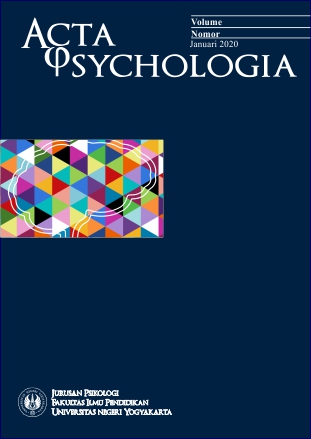Makna Hidup Penderita Kanker Payudara Pasca Mastektomi
DOI:
https://doi.org/10.21831/ap.v1i1.43305Keywords:
Makna hidup, penderita kanker payudara pasca mastektomi, fenomenologisAbstract
Makna hidup dapat diartikan sebagai sesuatu yang muncul dari dalam diri sebagai arah tujuan dalam hidup untuk menemukan suatu istilah yang dianggap bermakna. Penelitian ini bertujuan untuk menemukan bagaimana dinamika makna hidup pada penderita kanker payudara pasca mastektomi dan apa saja faktor-faktor yang memengaruhi makna hidup para penderita kanker payudara pasca mastektomi. Penelitian ini menggunakan metode kualitatif dengan pendekatan fenomenologis. Sebanyak lima responden terlibat dan diwawancarai secara mendalam. Analisis dari transkrip wawancara menggunakan IPA (Interpretative Phenomenological Analysis) agar dapat mengetahui esensi dinamika makna hidup dan juga faktor-faktornya yang ada pada orang yang mengalami kanker payudara dan sudah di mastektomi. Penelitian ini menunjukan adanya perubahan makna hidup pada penderita kanker. Sebelum didiagnosis kanker, para subyek memaknai hidupnya sebagai pribadi yang dapat memberikan kasih sayang terhadap keluarga dan berubah menjadi pribadi yang bersyukur dengan keadaan dirinya saat sakit dan ingin menjalani hidup lebih bermanfaat untuk lingkungan sekitar. Adanya perubahan makna hidup ini di pengaruhi oleh 7 faktor yang ditemukan dalam penelitian ini. Faktor-faktor yang memengaruhi makna hidup pada penderita kanker pasca mastektomi yaitu self insight, self commitment, spiritualitas, dukungan sosial, harapan, kebersyukuran, dan mindfulness.
References
Bastaman, H.D. (2007). Logoterapi :Psikologi Untuk Menemukan Makna Hidup dan Meraih Hidup Bermakna. Jakarta: PT. Raja Grafindo.
Beasley JM, Newcomb PA, Trentham-Dietz A, Hampton JM, Ceballos RM, Titus-Ernstoff L, dkk,. (2010). Social networks and survival after breast cancer diagnosis. J Cancer Surviv.4:372-380.
Botor, Nepthaly. (2015). Hope and meaning in life as predictors of depression in a group of selected filipino adolescents, Di akses pada 14 Februari 2019 https://www.researchgate.net/publication/281372377
Cahyono, W. E. (2014). Pelatihan gratitude (bersyukur) untuk penurunan stres kerja karyawan di pt. X. Calyptra. Jurnal Ilmiah Mahasiswa Universitas Surabaya, 3, 1-15.
Chintya, D. (2016). Hubungan antara gratitude dengan psychological well being pada mahasiswa UKSW yang kuliah sambil bekerja full time. Tugas Akhir. Salatiga: Universitas Kristen Satya Wacana. Di akses pada 16 Februari 2019
Chou, A. F., Stewart, S. L., Wild, R. C., & Bloom, J. R. (2012). Social support and survival in young women with breast carcinoma. Psycho-Oncology, 21, 125–133.
Cole, Brenda. S., Clare M.Hopkins , John Tisak, Jennifer L. Steel, Brian I. Carr. (2008). Assessing spiritual growth and spiritual decline following a diagnosis of cancer: reliability and validity of the spiritual transformation scale. Psycho-oncology. 17: 112-121.
Cummings, Jeremy P. & Pargament, Kenneth I. (2010). Medicine for the spirit: religious coping in individuals with medical conditions. Religions, 1, 28-53.
Curtis K, Osadchuk A, Katz J. (2011). An eight-week yoga intervention is associated with improvements in pain, psychological functioning and mindfulness, and changes in cortisol levels in women with fibromyalgia. J Pain Res. 4:189-20
de Boer MJ, Steinhagen HE, Versteegen GJ, Struys MM, Sanderman R. (2014). Mindfulness, acceptance and catastrophizing in chronic pain. PLoS One. 9: 1-6
Delgado R, York A, Lee C, Crawford C, Buckenmaier 3rd C, Schoomaker E, dkk. (2014). Assessing the quality, efficacy, and effectiveness of the current evidence base of active self-care complementary and integrative medicine therapies for the management of chroni
Denz-Penhey, H., Murdoch, C. (2008). Personal resiliency: serious diagnosis and prognosis with unexpected quality outcomes. Qual Health Res. 18: 391-404.
Dowd H, Hogan MJ, McGuire BE, Davis MC, Sarma KM, Fish RA, dkk,. (2015). Comparison of an online mindfulness-based cognitive therapy intervention with online pain management psychoeducation: a randomized controlled study. Clin J Pain. 6: 517-527.
Dunn J, Steginga SK, Rosoman N, Millichap D. (2003). A review of peer support in the context of cancer. J Psychosoc Oncol. 21: 55-67.
Frankl, V.E. (1984). Man's Search for Meaning: An Introduction to Logotherapy. New York: Souvenir Press
Frederickson, B. L. (2001). The role of positive emotions in positive psychology: The broaden-and-build theory of positive emotions. American Psychologist, 56, 218-226.
Froh, J.J., Bono, G., & Emmons, R.A. (2010). Being grateful id beyond good manners: gratitude and motivation to contribute to society among early adolescents. Motivation Emotion, 34, 144-157.
Gotink RA, Chu P, Busschbach JJ, Benson H, Fricchione GL, Hunink MG. (2015). Standardised mindfulness-based interventions in healthcare: an overview of systematic reviews and metaanalyses of rcts. Plos one. 10: 1-17
Habermas, T. & Bluck, S. (2000). Getting a life: The Emergence of the life story in adolenscence. Psychological Bulletin, 126, 748-769.
Hammer, K., Mogensen, O., Hall, E.O. (2009). The meaning of hope in nursing research: a meta-synthesis. Scand J Caring Sci. 3: 549-557.
Hassankhani, H., Firooz, Hasanzadeh., Kelly, A., Abbas, D. Z., Rouzbeh. R. (2017). Clinical skills performed by iranian emergency nurses: perceived competency levels and attitudes toward expanding professional roles. Journal of Emergency Nursing. 44: 156-163
Helgeson, V.S. (2003). Social support and quality of life. Quality of Life Research, 12, 25-31.
Herdiansyah, H. (2015). Metode Penelitian Kualitatif untuk Ilmu Psikologi. Jakarta: Salemba Humanika.
Howsepian B. A., Merluzzi T. V. (2009). Religious beliefs, social support, self- efficacy and adjustment to cancer. Psychooncology. 18: 1069-1079.
Hughes S, Jaremka LM, Alfano CM, Glaser R, Povoski SP, Lipari AM, dkk,. (2014). Social support predicts inflammation, pain, and depressive symptoms: longitudinal relationships among breast cancer survivors. Psychoneuroendocrinology. 42: 38-44.
Jutagir DR, Blomberg BB, Carver CS, Lechner SC, Timpano KR, Bouchard LC, dkk,. (2017). Social well-being is associated with less pro-inflammatory and pro-metastatic leukocyte gene expression in women after surgery for breast cancer. Breast Cancer Res Treat. 165:169-180.
Karakoyun-Celik, O., Gorken, I., Sahin, S., Orcin, E., Alanyali, H., & Kinay, M. (2010). Depression and anxiety levels in woman under follow-up for breast cancer: Relationship to coping with cancer and quality of life. Medical Oncology, 27, 108–113.
Knott, Vikki., Deborah, Turnbull., Ian, Olver., Anthony. Winefield. (2012). A grounded theory approach to understand the cancer"coping process. Health Psychology. 17: 551-564.
Koenig HG. (2012). Religion, spirituality, and health: the research and clinical implications. ISRN Psychiatry. 16: 38-52.
Kroenke CH, Michael YL, Poole EM, Kwan ML, Nechuta S, Leas E, dkk,. (2017). Postdiagnosis social networks and breast cancer mortality in the After Breast Cancer Pooling Project. Cancer. 123: 1228-1237.
Leung J, Pachana NA, McLaughlin D. (2014). Social support and health"related quality of life in women with breast cancer: a longitudinal study. Psycho" Oncology. 23: 1014-1020.
Lyubomirsky, S & Kristin L. (2013). How do simple positive activities increase wellbeing?. Psychological Science, 22, 57-62.
IARC (2012) Globocan 2012: Estimated Cancer Insidence, Mortality and Prevalence Worldwide in 2012. Diakses pada 26 Februari 2018
Moleong, L. J. (2016). Metodologi Penelitian Kualitatif. Bandung: PT Remaja Rosdakarya Offset.
Omidi A, Zargar F. (2014). Effect of mindfulness-based stress reduction on pain severity and mindful awareness in patients with tension headache: a randomized controlled clinical trial. Nurs Midwifery Stud. 3: e21136.
Park, C. L., Edmondson, D., Fenster, J. R. dkk. (2008). Meaning making and psychological adjustment following cancer: The mediating roles of growth, life meaning, and restored just-world beliefs. Journal of Consulting and Clinical Psychology, 76, 863–875.
Park, C. L. (2013) . Religion and meaning. In R. F. Paloutzian & C. L. Park (Eds.), Handbook of the psychology of religion and spirituality, 2nd Ed. (pp. 257- 279) . New York: Guilford.
F. Paloutzian & C. L. Park (Eds.), Handbook of the psychology of religion and spirituality, 2nd Ed. (pp. 257- 279) . New York: Guilford.
Remmers H., Holtgräwe M., Pinkert. C. Stress and nursing care needs of women with breast cancer during primary treatment: a qualitative study. Eur J Oncol Nurs. 14: 11-16.
Sherman, A. C., Simonton, S., Latif, U. dkk. (2010). Seeking and found meaning: Associations with health outcomes among breast cancer survivors. Journals of Behavioral Medicine, 39, 170.
Schmidt J. E., Andrykowski M. A. (2004). The role of social and dispositional variables associated with emotional processing in adjustment to breast cancer: an internet-based study. Health Psychol. 23: 259-266.
Smith, J. A., Flowers, P., & Larkin, M. (2009). Interpretative Phenomenological Analysis: Theory, Method, and Research. Los Angeles, London, New Delhi, Singapore, Washington: SAGE Publications, Inc.
Steger, M., Frazier, P., Oishi, S., dkk. (2006). The meaning in life questionnaire: Assessing the presence of and search for meaning in life. Journal of Counseling Psychology, 53, 80–93
WHO. (2015). Cancer, Diakses pada tanggal 4 Februari 2018, http://www.who.int/mediacentre/facts heets/fs297/en/#.
Winger, J. G., Adams, R.N., Mosher, C.E. (2016). Relations of meaning in life and sense of coherence to distress in cancer patients: a meta-analysis. Psychooncology. 25: 2-10
Downloads
Published
How to Cite
Issue
Section
License
Acta Psychologia allows readers to read, download, copy, distribute, print, search, or link to its articles' full texts and allows readers to use them for any other lawful purpose. The journal allows the author(s) to hold the copyright without restrictions. Finally, the journal allows the author(s) to retain publishing rights without restrictions
- Authors are allowed to archive their submitted article in an open access repository
- Authors are allowed to archive the final published article in an open access repository with an acknowledgment of its initial publication in this journal

This work is licensed under a Creative Commons Attribution-ShareAlike 4.0 Generic License.










